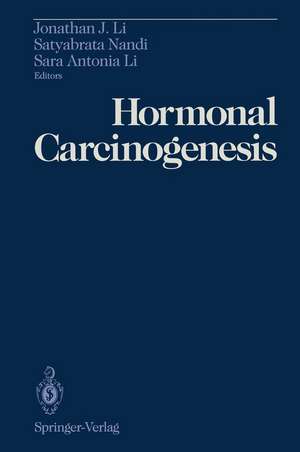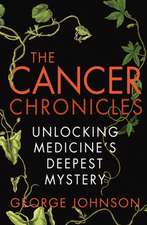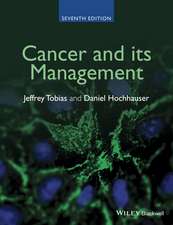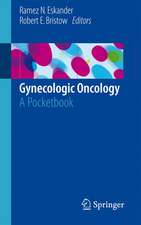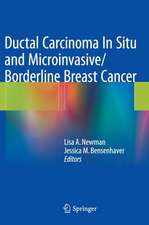Hormonal Carcinogenesis: Proceedings of the First International Symposium
Editat de Jonathan J. Li, Satyabrata Nandi, Sara A. Lien Limba Engleză Paperback – 8 noi 2011
Preț: 720.31 lei
Preț vechi: 758.23 lei
-5% Nou
Puncte Express: 1080
Preț estimativ în valută:
137.84€ • 144.57$ • 114.74£
137.84€ • 144.57$ • 114.74£
Carte tipărită la comandă
Livrare economică 01-15 aprilie
Preluare comenzi: 021 569.72.76
Specificații
ISBN-13: 9781461392101
ISBN-10: 1461392101
Pagini: 380
Ilustrații: XXXIV, 340 p.
Dimensiuni: 155 x 235 x 20 mm
Greutate: 0.53 kg
Ediția:Softcover reprint of the original 1st ed. 1992
Editura: Springer
Colecția Springer
Locul publicării:New York, NY, United States
ISBN-10: 1461392101
Pagini: 380
Ilustrații: XXXIV, 340 p.
Dimensiuni: 155 x 235 x 20 mm
Greutate: 0.53 kg
Ediția:Softcover reprint of the original 1st ed. 1992
Editura: Springer
Colecția Springer
Locul publicării:New York, NY, United States
Public țintă
ResearchDescriere
In the past decade there has been a growing public interest and resurgence in research in the field of hormonal carcinogenesis. This is due to the widespread use of therapeutic hormonal agents worldwide and to the increasing awareness of the causal association of hormones, both endogenous and exogenously administered, and a variety of human cancers. These associations include estrogens in uterine, cervical, vaginal, liver, testicular, prostatic, and possible breast cancers; progesterone and progestational hormones in breast cancer; androgens and anabolic steroids in hepatic and prostatic cancers. Additionally, gonadotrophins playa role in the etiology of ovarian and testicular cancers and thyroid-stimulating hormones in thyroid cancers. Therefore, hormonal carcinogenesis encompasses the study of both natural and synthetic hormonal agents, including growth factors and other peptide and protein factors, which contribute substantially to the etiology of both human and animal neoplasms, benign or malignant. Hormones may be involved in all aspects of neoplastic transformation, including initiation, promotion, and progression, and the inhibition of these processes. There are a number of important issues in women's health that need to be addressed. More than 40 million U. S. women are menopausal, and these women have a life expectancy of over 30 years after the menopause. When these figures are multiplied worldwide, the numbers become staggering. After the menopause, estrogen replacement therapy (ERT) is the choice of most women in industrialized countries.
Cuprins
Symposium Presentation: Diethylstilbestrol (DES) Syndrome: Present Status of Animal and Human Studies.- 1. Sex Hormones and Carcinogenesis.- Introduction: Androgen Receptors and Regulation of Androgen Action in Normal and Abnormal Cells.- 1 The Conjoint Actions of Androgens and Estrogens in the Induction of Proliferative Lesions in the Rat Prostate.- 2 Enhancement of Prostate Carcinogenesis in Rats by Testosterone and Prolactin.- 3 Hormonal Carcinogenesis in Syrian Hamsters: A Hypothesis Involving Glutathione S-Transferase Regulation.- 2. Hormones, Cell Proliferation, and Carcinogenesis.- Introduction: Current Concepts of Sex Hormone Action (An Overview).- 4 Control of Uterine Epithelial Growth and Differentiation: Implications for Estrogen-Associated Neoplasia.- 5 A Novel Protein Kinase Activity Identified from Human Breast Cancer Cell Lines.- 6 Estrous Cycle Modification of Rat Mammary Carcinoma Induction.- 7 Hormones, Cell Proliferation, and Mammary Carcinogenesis.- 3. Estrogen Metabolism and Carcinogenicity.- Introduction: Factors Influencing the Metabolism and Action of Estradiol.- 8 Interactions of Carcinogenic Estrogens with Microtubular Proteins.- 9 Differential Interactions of Estradiol Metabolites with the Estrogen Receptor: Genomic Consequences and Tumorigenesis.- 10 Oxidation of Estrogens and Other Steroids by Cytochrome P-450 Enzymes: Relevance to Tumorigenesis.- 11 Metabolism of Moxestrol in the Hamster Kidney: Significance for Estrogen Carcinogenesis.- 4. Hormones and Tumor Promotion.- Introduction: Inhibition of Tumor Promotion by Antihormonal Agents.- 12 Sexual Dimorphism of Hepatic Steroid Metabolism and Its Significance for Chemical Hepatocarcinogenesis.- 13 Growth Stimulation and Tumor Promotion in Rat Liver by Ethynyl Estradiol and Other Estrogens.- 14 Growth Factors in Murine Mammary Adenocarcinomas Induced by Progestins.- 15 The Influence of Steroid Hormones and Antihormones on the Growth and Differentiation of Normal Human Breast Cells in Culture.- 5. Growth Factors and Oncogenes.- Introduction: Molecular Mechanisms of Hormonal Carcinogenesis.- 16 The v-raf and Ha-ras Oncogenes Inhibit Transcription from the Beta-Casein Gene Promoter by Suppression of a Mammary Gland Specific Transcription Factor.- 17 Functional Aspects of EGF-Like Peptides in Ovarian-Steroid Responsive Organs.- 18 Androgen Regulation of Growth Factor and Early Growth Response Gene Expression in Hamster DDT1-MF2 and Human Prostate LNCAP Cells.- 19 Estrogen Regulation of Protooncogene Expression.- 6. Carcinogenesis Risk Assessment of Sex Hormones.- Introduction: Receptor-Mediated Carcinogenesis: Implications for Carcinogenic Risk of Sex Hormones.- 20 Endogenous Estrogen and Progesterone as the Major Determinants of Breast Cancer Risk: Prospects for Control by ‘Natural’ and ‘Technological’ Means.- 21 Synthetic Estrogens and Liver Cancer: Risk Analysis of Animal and Human Data.- 22 Carcinogenic Risk Assessment of Steroid Hormone Exposure in Relation to Prostate Cancer Risk.- Closing Remarks.- Hormonal Carcinogenesis—Future Perspectives.- Communications.- Cytogenetic Changes in Renal Neoplasms and During Estrogen-Induced Renal Tumorigenesis in Hamsters.- Pituitary Regulation of Sex-Differentiated Promotion of Rat Liver Carcinogenesis.- Modulation of Estrogen Metabolism by Inducers of P-4501A2: Possible Application to the Chemoprevention of Breast Cancer.- Estrogen Metabolism in Subcellular Preparations and Tissue Culture of Syrian Hamster Liver and Kidney.- Hormonal Regulation of Plasminogen Activation in the Human Endometrium.- Your Research—Our Lives.- Prostaglandin H Synthase Peroxidase Catalyzed Metabolism of Estrogens in Syrian Hamster and Rabbit Kidney.- Peroxidative Metabolism of Diethylestilbestrol in Ram Seminal Vesicle Cell Cultures: An In-Vitro Model for Studies of Estrogen-Induced Genotoxicity.- In Vivo Effects of Progesterone on Human Breast 17?-Dehydrogenase and Epithelial Cells Mitotic Activities.- DNA Adduct Profiles in Hamster Kidney Following Chronic Exposure to Various Carcinogenic and Noncarcinogenic Estrogens.- Hormone-Dependent Activation of c-Ki-ras in N-Methyl-N-Nitrosourea (MNU)-Induced Mouse Mammary Tumors.- Growth Hormone Regulation of the c-myc Gene During Sex-Differentiated Rat Liver Carcinogenesis.- Fetal Stromal Cells Produce a TGF that Elicits Hyperplasia in Adult Mammary Epithelium.- Induction of Catechol Estrogen Formation by Indole-3-Carbinol.- Cytochrome P-450 Mediated Activation and Irreversible Binding of Tamoxifen to Rat and Human Liver Proteins.- Neonatal Diethylstilbestrol Prevents Spontaneously Developing Mammary Tumors.- Hormone-Dependent Uterine Adenocarcinoma Following Developmental Treatment with Diethylstilbestrol: A Murine Model for Hormonal Carcinogenesis.- Effects of Steroidal and Stilbene Estrogens and Their Peroxidative Metabolites on Microtubular Proteins.- Properties of Micronuclei Induced by Various Estrogens in Two Different Mammalian Cell Systems.- High-Performance Liquid Chromatography Method for the Separation of Potential Metabolites of Estradiol.- Ovarian Hormones Enhance the Carcinogenic Activity of 2,3,7,8-TCDD in Rats.
